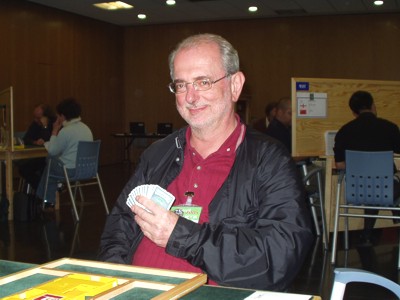The World Bridge Federation has addressed the inequities in the Victory Point scales it uses by forming a Scoring Committee chaired by Ernesto d’Orsi (BRZ) and comprised of Co-Chair Max Bavin (ENG), Henry Bethe (USA), Bart Bramley (USA), Peter Buchen (AUS), and Maurizio de Sacco (ITA). After “deep and long analysis”, the committee has recommended changes that have been accepted by the WBF Executive and that will commence with the next World Championship. The philosophy of the committee was twofold: (i.) “every IMP counts”; and (ii.) IMPs closer to zero count more than those further from zero. The crux of the change is that the VP scale will now have a range 0-20 VP, to two decimal places. IMPs closer to zero ( a draw) will never be worth more than previous IMPs, as could happen now, In the current scale, if a 6-IMP win is16-14 VP and a 7- or 8 IMP win is17-13 VP, that seventh IMP is worth more than the eighth.
One could not have put together a more august committee and the result for the players is definitely a step in the right direction. However, we have a concern with the accessibility of the method for the average player. In an era when bridge is on life support systems in many jurisdictions, we should be looking at ways to simplify the game for more universal appeal. Even for the top players, when the question is asked, “We won by 23 IMPs, how many VPs is that?” no one will know the answer without referring to a table (those of us old enough will be reminded of logarithm tables as they were similar in nature). Furthermore, when you’re ahead or behind by 4.73 VP, it will be more difficult than now to envision how much you need to win by to maintain the lead (or catch up).
The committee took the view that, in a round robin formatted event, there is some value in beating an opponent (but not as much as a Win-Loss scoring method would afford), thus the contracting IMPs-to-VPs schema. However, we see no reason for this being so – it is certainly not an intrinsic virtue, but an assumed one. In a round robin, to qualify eight or sixteen teams for knockout play, you want
the eight (or sixteen) teams that have played the best to qualify. Wouldn’t this be exibited more surely by a straight IMP-to-VP conversion (subject to a cap in each match)? Thus, if 100 VP were at stake in every match, 50 IMPs would be a blitz. About three IMPs per board seems a good standard for a blitz. In short, we agree with the philosophy that every IMP should count but disagree with the conclusion that some IMPs should count more than others and would prefer a straight one-to-one conversion for simplicity. We’d go further yet and try this experiment: score the round robin at point-a-board (15-board matches for a round number) with two points for a win on a board and one point for a draw, thus 30 points would be at stake in every match (or 1 and 1/2 as in North America). Then score the knockout matches the same way. What could be simpler?

IBPA Bulletin Editorial: September 2012
Topics
- 2013 Monaco Cavendish
- 2013 Monaco Cavendish 1
- 2013 Monaco Cavendish 2
- 2014 Sanya
- 2014 Sanya 1
- 2015 Buenos Aires
- 5 O'Clock Bridge I.
- 5 O'Clock Bridge II
- 5 O'clock Bridge III
- 5 O'Clock Bridge IV
- A Babe in the Woodsi
- Advanced
- Advanced 1
- Advanced 2
- Advanced 3
- Advanced 4
- Answer To your bid
- Argentine Bridge News
- Article of the Day
- Article of the Day 1
- Article of the Day 2
- Article of the Day 3
- Article of the Day 4
- Bali 2013
- Bali 2013: Fresh News
- Bali 2013: Last News
- Beginners
- Beginners - 1
- Beginners - 2
- Beguiners 3
- Beguiners 4
- Bols Tip
- Brazilian Bridge News
- Bridge & Humor
- Bridge & Humor I
- Bridge & Humor II
- Bridge ++
- Bridge Fun
- Bridge Hands
- Bridge Hit
- Bridge in Chile News
- Bridge Online
- Bridge Rules
- Bridge Sports
- Bridge Systems
- Card Play
- CE I
- CE II
- Central Event
- Conventions
- conventions I
- Conventions II
- Conventions III
- Conventions IV
- Daily Article
- Daily News
- Defense
- Experts Panel 1
- Experts Panel 2
- Experts Panel 3
- Experts Panel 4
- Five O'clock Bridge
- French Bridge News
- Hand Evaluation
- Hand Evaluation I
- Hand Evaluation II
- Hand Evaluation III
- Hand Evaluation IV
- Hand I
- Hands 2
- Hands 3
- Hands 4
- Hands AR 2012
- Hands AR 2013
- Hands AR 2014
- I BA
- IBPA Editorial
- II BA
- Intermediate
- Intermediate 1
- Intermediate 2
- Intermediate 3
- Intermediate 4
- Interviews
- It Ain't Necessarily So
- Italian Bridge News
- LC Standardi
- NABC
- NABC 1
- NABC 2
- NABCi
- Net Surfing
- News
- Noticias de Hoy
- Sanya 2014 2
- Signaling
- South American Bridge
- Spain Bridge
- Spingold Hands I
- Spingold Hands II
More
CATEGORIAS POPULARES

